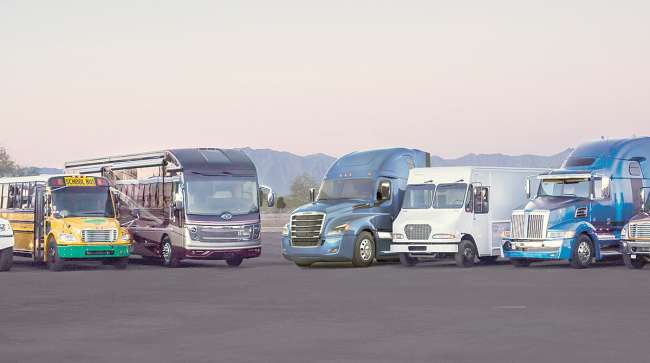Senior Reporter
Daimler 1Q Net Income Dips, Revenue Flat

Daimler AG reported first-quarter net income dipped and revenue was flat amid a range of constraining factors affecting cash flow, and despite gains in truck sales.
Truck sales in the United States topped 20% from a year ago while market share also rose.
For the period ended March 31, Daimler (which reports in Euros) had net income that was the approximate equivalent of $2.3 billion, or $2.18 per diluted share. That compared with $2.7 billion, or $2.36, a year earlier.
Revenue was stable at $44.2 billion, compared with $44.3 billion in the 2018 period.
“We had a comparatively weak start to the year and face numerous challenges along the entire value chain in all our automotive divisions,” Bodo Uebber, chief financial officer at Daimler, said in a company release.

Daimler CFO Bodo Uebber (left) and CEO Dieter Zetsche by Guenter Schiffmann/Associated Press.
“This had a negative impact on unit sales and earnings. Above all, high inventories and bottlenecks in the supply chain had a substantial negative impact on the cash flow. Nonetheless, we will continue to invest in our future — sensibly and with a clear focus,” he said.
Total sales dropped 4% to 773,796 units compared with 806,905 a year earlier.
Mercedes-Benz Cars, its largest division and the world’s largest luxury car maker, saw sales fall to 555,312 vehicles in the first quarter, or 7% less than in the 2018 quarter.
Uebber cited the general market conditions, model changes and the lack of inventory in some international markets as reasons for the sales decline. “The general conditions for our business remain anything but easy, but demand for our cars continues to be at a solid level.”
Additional factors that hurt earnings were weaker pricing, exchange rate effects and advanced expenditure for new technologies and vehicles, he added.
Daimler also is the world’s largest truck maker. The truck unit faced additional costs from higher raw-material prices and supply-chain bottlenecks, according to the Stuttgart, Germany-based company. Sales, however, increased by 2% to 115,920 vehicles in the first quarter, compared with 113,846 a year earlier.
Truck sales in the North American region jumped 20% to 47,411 units compared with 39,387 in the 2018 period.
In the United States, retail sales rose 22% to 41,976 compared with 34,547 a year earlier.

A Daimler AG Mercedes-Benz GLC Coupe SUV is displayed during the 2019 New York International Auto Show on April 18. (Natan Dvir/Bloomberg News)
At the same time, U.S.-based orders for its trucks in the quarter plunged 66% to 24,246. That was down from 72,236 a year earlier.
Meanwhile, Daimler’s Class 8 U.S. market share in the quarter increased to 44.6% compared with 40.1% a year earlier.
For Classes 6-7, its share fell to 39.7%, down 4.3 percentage points from a year earlier.
Revenue at Daimler Trucks increased by 11% to $10.5 billion compared with $9.6 billion a year earlier, and return on sales fell to 6.1%, down from 7.5% in the 2018 quarter.
Daimler’s outlook for its North American and European truck divisions called for a slight increase in sales in 2019 compared with 2018.
“We are also investing into connectivity and electric and autonomous driving in trucks, which was a burden also in the first quarter and we had some valuations, which we hopefully will not have in each and every quarter to come,” Uebber said during an earnings conference call. “Having said this, the first quarter is always a weaker quarter in trucks, when you look back into our past. Yes, we are starting slow as always, so to say, and it will be better by, far better, in the second half of 2019. That’s the story, the target is clear. And the truck guys know what they need to do and want to do for the quarters to come.”
When two of Daimler's electric vehicles meet in Las Vegas... join the eCascadia and EQC for a ride.#CES2019 #CES #eMobility
[EQC 400 4MATIC | Stromverbrauch kombiniert: 22,2 kWh/100 km | CO₂-Emissionen kombiniert: 0 g/km | https://t.co/i9VSL1tIyB ] pic.twitter.com/Nocdi68Un7 — Daimler AG (@Daimler) February 12, 2019
As a quarterly highlight, the company pointed to the annual CES technology show, where Daimler Trucks presented what Uebber described as the first partially automated actual truck — its flagship Freightliner Cascadia model — in serious production in North America.
“With the acquisition of a majority stake in Torc Robotics, a pioneer in the field of autonomous driving, we are creating a powerful and innovative team to bring Level 4 automated trucks on to the road,” Uebber said. “2019 continues to be a year of a big change, we are restructuring our company, we are accelerating into the new era of electric mobility and we are pushing connectivity, autonomous driving and mobility services into a new dimension.”




